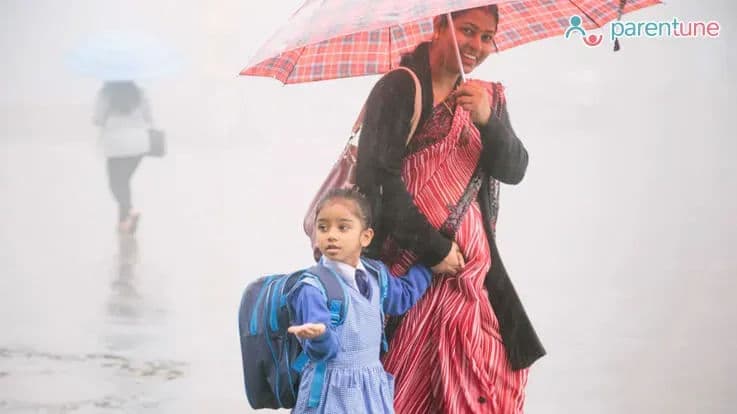Know Water Borne Diseases Symptoms to Watch-out in Monsoon

On the onset of monsoon, we are exhilarated with the soothing weather however with the heavy downpours - parched lakes and dams overflowing leads to water containment at places within or outside the towns. Eventually, leading to spurt in water-borne diseases!
Mostly mosquito-borne and virus borne diseases spread during monsoon. Apart from the common heat exhaustion and dehydration phenomenon other dangerous ones such as dengue, chikungunya and malaria also peak during the rains. The contaminated and contained water also causes diseases like diarrhoea and typhoid.
5 Common Water-borne Diseases with their symptoms.
Typhoid- Typhoid is caused by the bacteria named “Bacterium Salmonella typhi”. Some of the common symptoms are high fever, chills, headache and diarrhoea. Try and carry water bottles from home when going out with kids to refrain drinking contaminated water from stalls or public places. Typhoid fever is caused specifically because of open defecation. The bacteria can survive for weeks in water or dried sewage. Do see a doctor in case of the above-mentioned symptoms.
Home Remedies for Typhoid fever
- Homemade ORS - Mix ½ small spoon of salt and 6 small spoons of sugar in 4 cups of clean drinking water. Drink this homemade ORS several times a day until your child recover from the illness.
- Apple Cider Vinegar- Mix ½ teaspoon of raw and unfiltered apple cider vinegar with an appropriate quantity of honey in a glass of water. You can give it to your child to drink it before eating your meals. Follow this remedy for 5 to 7 days.
Dengue – Dengue is caused by tiger mosquitoes and is one of the recent epidemics which has claimed lives in areas adjoining NCR and other parts of India. The symptoms include fever, body aches, joint pain, and rashes. Dengue spreads instantly and in case of the above symptoms immediately see a paediatrician. To diagnose this deadly disease blood test for antibody for dengue virus, complete blood count, Polymerase chain reaction (PCR) test for dengue virus and Liver function test are conducted.
Home Remedies for Dengue fever
- Giloy – It’s a very important herb and helps in maintaining the metabolic rate along with increasing the WBC count and thus strengthening the immune system. 3-4 Tsbps of Giloy juice can be given 2-3 times daily.
- Papaya Leaves – Papaya leaves helps in increasing the platelet count and reduces the symptoms of fever like body ache, chills, feeling low, getting tired easily and nausea.You can read about the disease in detail here - This Monsoon Check Dengue Symptoms, Treatment & Prevention Tips for Your Child
Malaria: Malaria is again caused by stagnant water mosquitoes. Its symptoms include rapid rise and fall in body temperature and tremendous sweating. The precaution one can take in restricting this disease is to stop breeding mosquitoes in stagnant waters that are scattered across the cities and smaller towns. One can visit the Doctor and upon a confirmation through a simple blood test medication can be given.
Home Remedies for Malaria fever.
Ginger – One of the common and popular treatments for malaria is the use of ginger. It is easy to access and can be boiled down into a powerful decoction that will boost your immune system and help speed up the recovery process after an infection.
Grape Fruit – Grapefruit has similar qualities to quinine. It helps in neutralizing bite effects of malaria-inducing parasites. You can either extract the pulp and use it as a concentrated dose or can add some delicious grapefruit to your child's diet.
Viral Fever: It is caused by virus laden water droplets from infected areas where waterlogging is spread. Some of the common symptoms are body fatigue, chills, body aches, runny nose, sore throat, cough, hoarseness, muscle aches and fever. Generally only fever controlling medicines are prescribed however it is always advisable to see a paediatrician in case the situation is not under control. A healthy combination of immunity boosting foods and physical activity can help the body fight with the viruses.
Home Remedies for Viral fever.
Tulsi Leaves – Tulsi leaves has anti-bacterial, germicidal, anti-biotic and fungicidal properties. To utilise it you could boil some tulsi leaves in clean water, and mix a half-spoon clove powder. Let the solution boil until the solution shrinks to half. Drink this solution twice for 3-4 days or during the duration of viral fever.
Ginger and Honey - It is generally advised to consume some dry ginger with some honey so as to get rid of viral fever.
Be the first to support
Be the first to share
Comment (0)
Related Blogs & Vlogs
No related events found.
Loading more...